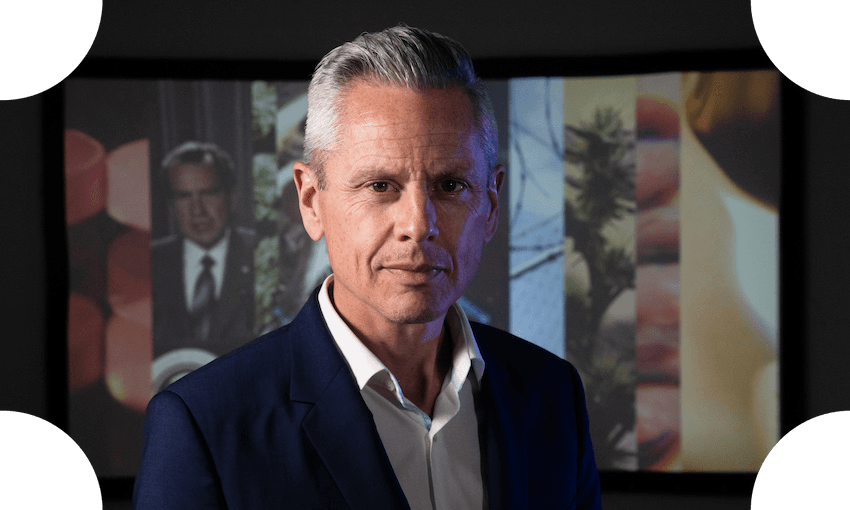Two critical TV programmes on our drug laws in two weeks are a clear sign that Aotearoa wants change, says the NZ Drug Foundation’s Sarah Helm. But is the government listening?
When you spend years pushing for change, there are certain moments when you can feel things shifting. Moments when all of the effort feels worth it.
This week feels like one of those moments, because we have not one but two documentaries asking serious questions about our broken approach to drugs, screening in primetime across our two mainstream TV channels.
That fact is a pretty good indication of how much attitudes have shifted in Aotearoa, and it squares with what we have seen in opinion polling: 68% of New Zealanders want to replace our drug laws with a health-based approach.
Guyon Espiner: Wasted, which screened last night on TVNZ and RNZ, was the first documentary out of the blocks (Patrick Gower: On All the Drugs screens next Tuesday on Three). It does a brilliant job of laying bare not only how ineffective our 50-year-old prohibition approach to drug use has been, but the real harm it’s doing.
Espiner unpacks the “war on drugs” through the substance many New Zealanders consider most harmful – methamphetamine. He talks with police, Australian politicians, treatment providers and us here at the Drug Foundation, but most importantly he speaks to people who’ve had personal experience with the drug and takes time to dig into their individual circumstances.
One of those people is Jolie Leach, from Haven, a peer-led support service in Tāmaki Makaurau. She makes the point that people either use drugs to “numb pain or to seek pleasure”. Hearing some of the stories from the “numbing pain” end of the spectrum makes you wonder why anyone would think a criminal approach makes sense.
Espiner explains that addiction, our drug laws and stigma all created a black hole that was hard to escape for Leach. She agrees that while methamphetamine can cause health problems, criminalisation simply compounds them by shutting you out and raising barriers to reach for help. “Secrets keep you sick,” she says.
To me, this is one of the strongest arguments for decriminalisation, and it’s a theme that runs through so many of the stories I hear from people who needed help but were too afraid to reach for it. Criminalisation doesn’t deter drug use, but it does deter people from seeking help. You can’t claim to want a health-based approach to drugs while continuing to wield a big stick over those who use them.
The great thing is we already have a model of what a health-based approach to methamphetamine could look like, right here in Aotearoa. Espiner spends time looking at how Te Ara Oranga has worked in Northland, where police actively knock on doors to refer people who use methamphetamine to health and support pathways, instead of sending them into the justice system.
Detective Shane Pilmer, a cop involved in the programme, is just one of the law enforcement voices in the documentary who have a background in the drug bust mentality of the police drug squad, but who have shifted their thinking. “When I started doing the door-knocking myself and seeing the response from the people, it just completely changed my mindset,” he says. “What is the benefit of prosecuting them? Aren’t we better off trying to help them to get off the drug?”
It’s something that seems obvious to those of us fighting for law reform, but it’s always powerful hearing it from a serving officer.
Espiner points out that while Te Ara Oranga is “special and successful” and is being rolled out to parts of the Eastern Bay of Plenty, it’s currently an outlier. By and large, the approach across the rest of the country is still in line with the failed “war on drugs”.
The documentary also looks across the ditch for another useful model of drug law reform. Australian Capital Territory, which has already legalised cannabis use, has recently decided to decriminalise small quantities of most drugs under a scheme that will come into force next year.
In explaining why they’ve made the shift, it’s refreshing to hear ACT health minister Rachel Stephen-Smith clearly assert that criminalisation causes significant harm for people who use drugs. Her state is a positive example of political progress where we’ve unfortunately had very little.
In a response to the documentary on RNZ this morning, our own health minister, Andrew Little, admitted that our drug laws were “out of date”, but pointed to the cannabis referendum result to suggest that there isn’t social licence for reform.
Our opinion polling suggests a vast majority of New Zealanders want to scrap our drug laws and put a health-based approach in place instead.
If you step back from the powerful individual stories in Guyon Espiner: Wasted, you see a story of good people – from police, to Customs, to treatment providers and peers – all working inside and against a system they know is completely upside down. Trying to take a humane, health-based approach inside a legal framework that is still at “war” with New Zealanders and causing them harm.
We can either choose to resign ourselves to this, or we can choose to face up to the challenge. If politicians believe in something, they can choose to work to build the social licence they need for change.
One of the biggest hurdles to law reform is showing what a criminal approach would be replaced with. Guyon Espiner: Wasted demonstrates that decriminalisation doesn’t mean doing nothing. Instead, through telling the story of Te Ara Oranga and other human stories, Espiner has set out the alternative, and much more effective and humane, approach that awaits us in Aotearoa.
I’m looking forward to seeing how Paddy Gower tackles the issue next Tuesday.



